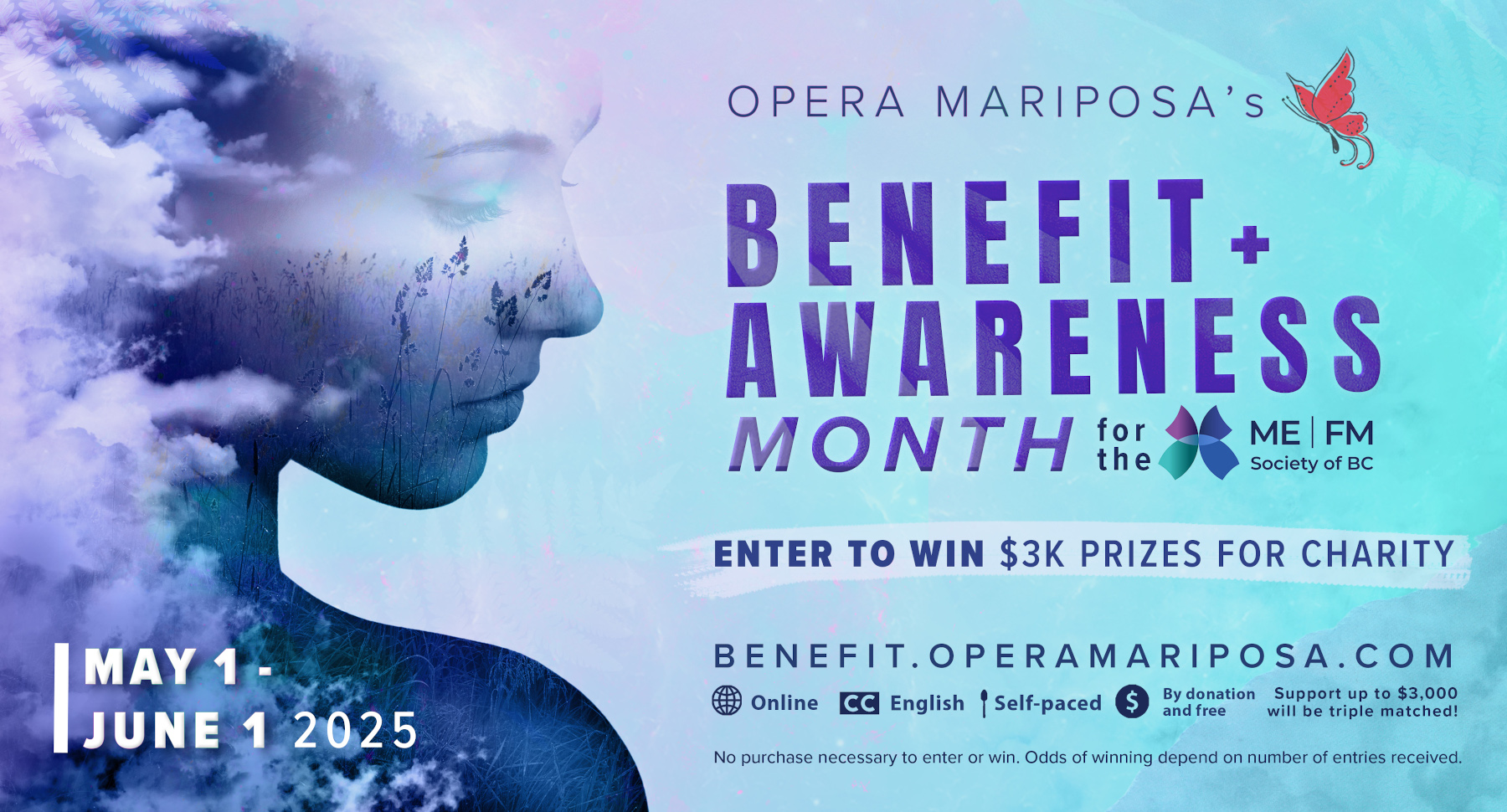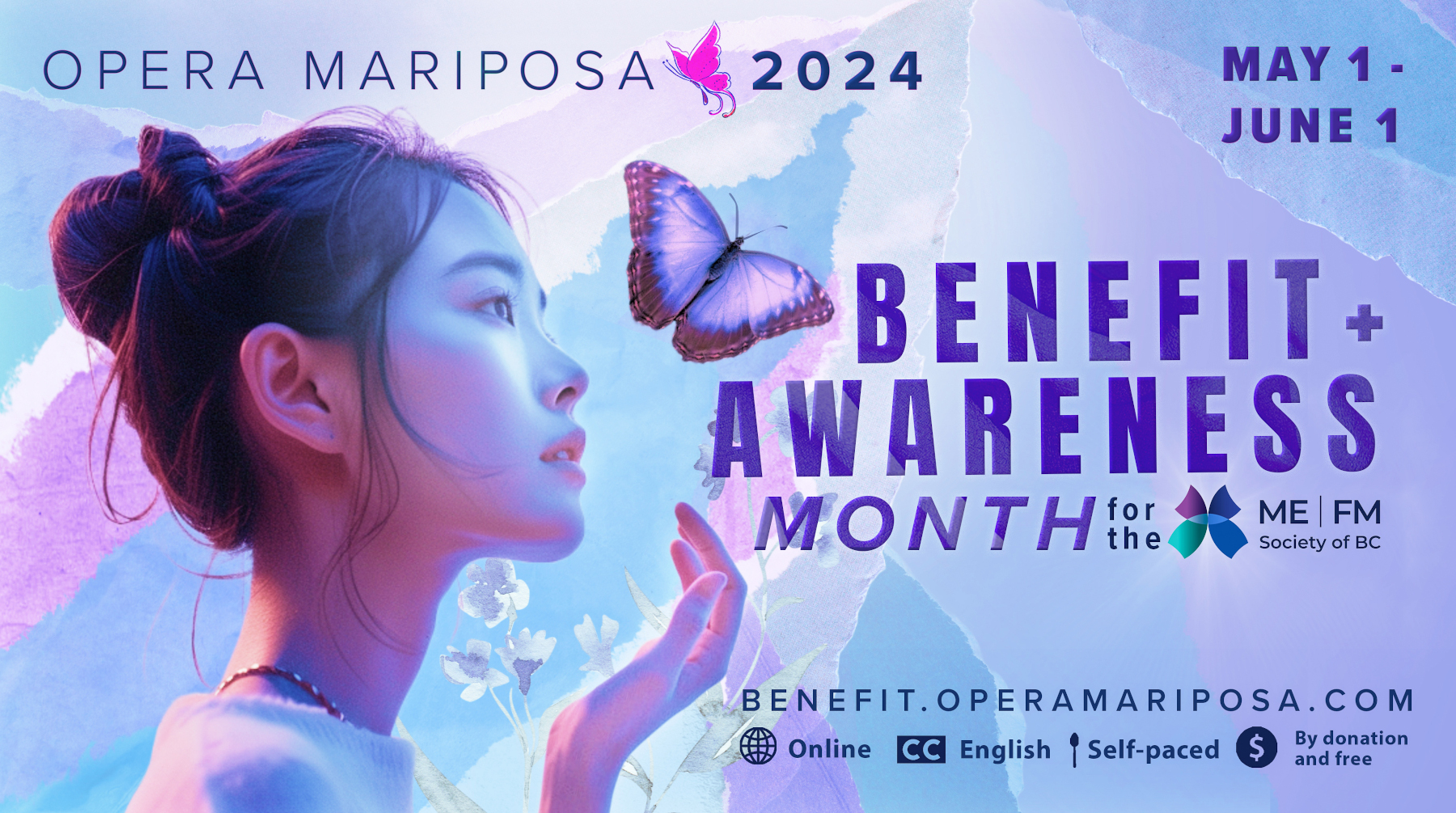There is a scene in a season 5 episode of ’80s sitcom The Golden Girls where one of the main characters, Dorothy, who has been…
Comments closedTag: myalgic encephalomyelitis
Chronically ill artists honour International Awareness Month for chronic neuro-immune diseases
Vancouver’s Opera Mariposa presents month-long programme benefitting the ME | FM Society of BC
April 30, 2025 (Vancouver, BC) – This May, Canadian artists are rallying the community to support people with chronic and post-infectious illnesses. From May 1 to June 1, Vancouver’s Opera Mariposa is presenting their 2025 Benefit + Awareness Month: an all-digital charity extravaganza featuring art, prizes, and special programming benefiting the ME | FM Society of BC.
May is the International Awareness Month for chronic neuro-immune diseases, and Mariposa’s programming is created by and for people impacted by Myalgic Encephalomyelitis (ME or ME/CFS), Long Covid, and Fibromyalgia. These complex multisystem illnesses affect millions of people across Canada – and that number is rising, given that they can be triggered by viruses, including COVID-19.
Comments closedME/CFS cases in England higher than first projected
Almost two-thirds more people are living with ME/CFS in England than previously thought, a study says.
The new estimate suggests that approximately 404,000 people are affected by ME/CFS (myalgic encephalomyelitis/chronic fatigue syndrome), a 62 per cent rise from the previously accepted figure of 250,000.
Comments closedLong COVID patients show brain swelling linked to memory and concentration problems, study finds
Long COVID patients exhibit swelling in an area of the brain linked to memory problems, poor concentration and delayed responses during conversations, researchers have found.…
Comments closed1 in 20 COVID survivors may have condition characterized by extreme fatigue
New results from the National Institutes of Health’s Researching COVID to Enhance Recovery (RECOVER)-Adult Initiative suggest that 4.5% of COVID-19 survivors have myalgic encephalomyelitis/chronic fatigue syndrome (ME/CFS), compared with less than 1% of their uninfected counterparts.
ME/CFS, which can be triggered by viral and non-viral infection, causes severe fatigue for at least 6 months and may entail impaired memory, brain fog, dizziness, and muscle or joint pain. Physical or mental activity exacerbates symptoms, which aren’t fully relieved by rest.
RECOVER-Adult is a longitudinal observational study conducted at 83 sites in 33 states, Puerto Rico, and Washington, DC, to research post-COVID conditions such as ME/CFS and long COVID.
Comments closedLong COVID is snuffing out some patients’ dreams of having children, sharpening the pain of loss, grief and medical neglect.
When Melanie Broadley and her husband started going out in 2019, like many couples their age they decided to put “starting a family” on the shelf for a few years so they could focus on their careers. A postdoctoral researcher who studies diabetes and psychology, Broadley was 28 and in good health — she had plenty of time, she reasoned. Then, in 2022, she caught SARS-CoV-2 and developed long COVID, blowing up her life as she knew it and, for now at least, her hopes of having a baby.
“I became totally disabled by long COVID,” says Broadley, 34, who lives at her parents’ house in Brisbane. On a good day she struggles with debilitating fatigue that worsens after any kind of physical or mental activity, an autonomic nervous system disorder called postural orthostatic tachycardia syndrome (POTS), which causes her heart rate to spike when she stands up, cognitive dysfunction that means she can’t read or write for more than 10 minutes at a time, and an immune disorder, called mast cell activation syndrome, that triggers allergic reactions. Even though she’s been doing everything she can to recover, she’s still too unwell to cope with a potential pregnancy.
Comments closedAbout 2,000 patients are on the long COVID clinic waiting list
(Montreal) The rehabilitation process is long for patients with long COVID, which can limit professionals in their acceptance of new patients. This issue, added to the other ills of the healthcare system, means that some 4,000 patients end up in the network of long COVID clinics, half of whom are on the waiting list.
Comments closed‘Do no harm’ is hurting 400 million long Covid patients worldwide
Imagine, for a moment, that you wake up one morning with a debilitating illness that won’t let go. Weeks and months pass, but the crushing fatigue, constant headaches, and aching muscles remain. You can’t think straight. Simply showering or doing the dishes leaves you floored for days at a time, and the unpredictable symptoms — shortness of breath, dizziness, a racing heart — ebb and flow without warning. You find your life as you knew it slipping away.
This is life with long Covid: a condition that transforms the familiar rhythms of daily life into a living nightmare and constant battle for energy and clarity. But what happens when the only hope of lessening its severity becomes an issue of equity?
We are two of the more than 400 million people worldwide who have experienced long Covid. While we are both over four years into this illness, there is still not a single FDA-approved treatment for this devastating condition. Given the slow pace of research and development, there is unlikely to be proven treatment for years — possibly decades.
Comments closedAs COVID Surges, the High Price of Viral Denial
COVID is surging once again and, if you live in British Columbia, you probably already know someone sick with fever, chills and a sore throat.
As of mid-August, about one in every 19 British Columbians were enduring an infection, with or without symptoms.
Although the media routinely dismisses all COVID infections as an inconsequential nuisance, that’s not what the science says. The virus remains deadlier than the flu and repeated infections can radically change your health.
Comments closedVancouver’s Opera Mariposa presents month-long programme benefitting the ME | FM Society of BC
This May, Opera Mariposa is rallying the community to support people with chronic and post-viral illnesses. From May 1 to June 1, 2024, the disability-led indie arts company is presenting their 2024 Benefit + Awareness Month: an all-digital charity extravaganza featuring music, art, prizes, and special events benefiting the ME | FM Society of BC.
The initiative honours the International Awareness Month for chronic neuro-immune diseases, and it showcases disabled and chronically ill artists from around the world. Proceeds aid people and families affected by myalgic encephalomyelitis (ME or ME/CFS), fibromyalgia, and long COVID – a group of complex chronic illnesses that are surging due to long-term health impacts from COVID-19.
Comments closed

